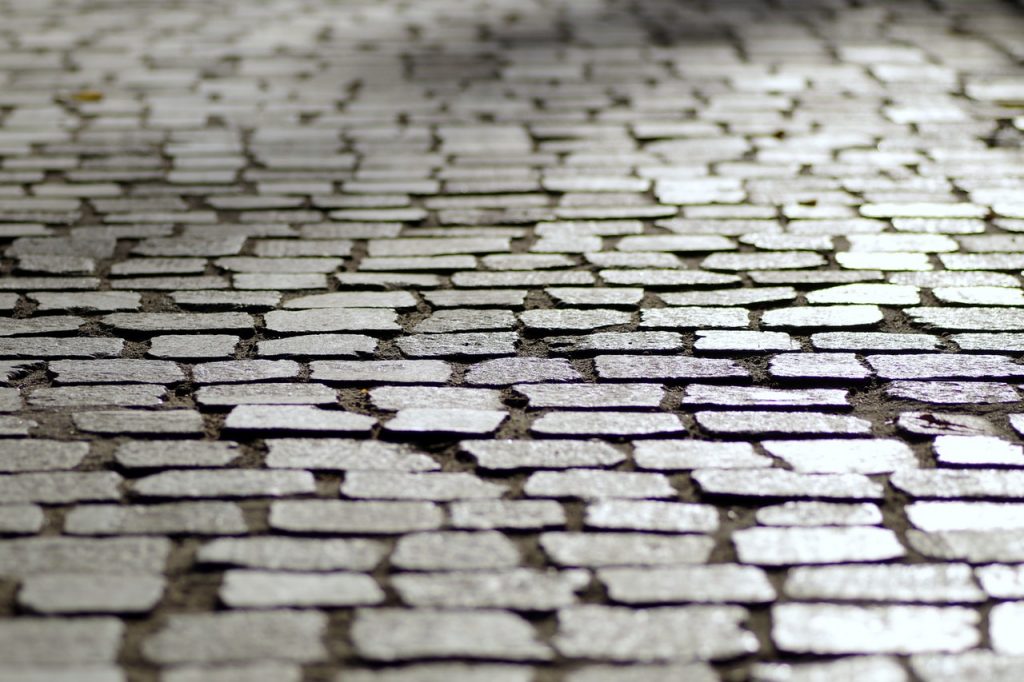
Choosing what type of paver to use is an important decision that you’ll have to consider before starting a paving project. And there’s no way not to get caught up on the brick vs concrete debate when it happens.
Which one is the more affordable solution? Which one has a more extended lifespan? What are the differences between them? You will find all your answers in our comprehensive comparative analysis.
Brick vs Concrete Pavers: Know what makes them different
 Most people don’t know the difference between brick and concrete pavers, but that doesn’t have to be a problem. We are here to showcase the differences between these two options for paving your driveway.
Most people don’t know the difference between brick and concrete pavers, but that doesn’t have to be a problem. We are here to showcase the differences between these two options for paving your driveway.
What are brick pavers?
A classic choice!
In regards to brick pavers, the word “brick” is referring to the materials used to create them. They have nothing to do with their formatting. That’s why there seems so much confusion around them.
Clay bricks are what you need if you are after quality, versatility, and durability! You can get these items in plenty of different colors.
These pavers offer a classic, natural look, that’s been cherished for generations. We’ll cover this in more detail later.
This article is not about any brick paver that’s not made of clay. Concrete bricks might be sold under this name because they imitate the shape of real bricks.
What are concrete pavers?
 A versatile choice!
A versatile choice!
Concrete pavers are one of the most popular formats on the market. They have a lower price point and can be used in a lot of different applications.
Now that we’ve covered the basics, let’s compare the pros & cons of each great paver material option to help you make an informed decision.
Appearance
Are you looking for a grander, more stately facade with your brick paving? Or maybe something with a cleaner, more contemporary look? Both of these are available!
Brick pavers are generally supplied in standard rectangular sizes. That means the colors take on the natural tint of different clays used, and you can choose from a variety of colors like red, pink, and brown.
Concrete pavers are a much more diverse option when it comes to size and color. They can be found in a wide variety of formats, and since they’re pigment-based, they come in almost any imaginable color.
Durability
Comparing the durability of bricks vs cement pavers is no easy task since there are two factors to take into account.
The type of material you choose should depend on how long you want it to last. Polyester, for example, will not hold up as well as cotton in cold weather.
Color retention
The natural hue of the pavers comes from their composition. They also can last longer than concrete. Generations vs decades, bricks come out ahead here.
Concrete pavers are impermeable to stains but can discolor if submerged in sunlight. Sealers are used to maintain the porcelain finish for a new paver that will last many years without any discoloration.
Resistance to damages
 Concrete and bricks are both highly durable materials. When it comes to high-pressure resistance, they’re both able to withstand 10,000 psi.
Concrete and bricks are both highly durable materials. When it comes to high-pressure resistance, they’re both able to withstand 10,000 psi.
The main difference is that bricks can sometimes break, crack or chip – which is something concrete won’t do. Really, those things will never happen to concrete. Nohow. However, if not properly taken care of, the structures of concrete will start to wear away over time.
It’s always sad when your driveway or walkway has cracks or tumbles in it. However, with our tumbled paver system these imperfections are hardly noticeable. If you have just a few of these troublesome pavers, it’s surprisingly easy for us to fix the problem by simply replacing them with newer ones.
Style
Brick pavers are the perfect choice for those looking to achieve that timeless, classic style. Their color and size make them suitable for patios of any size, meaning they’ll never go out of fashion. Brick patios have been trending for centuries and there’s no sign that this will change anytime soon.
Concrete pavers can also vary in size, shape, and color; all of which should be considered when deciding to use them for your project. They can usually add a classic look or match other surfaces such as brick and natural stone pavers.
Concrete stains are just one of the many reasons that concrete is an essential building material. Not only can it provide your patio with a lovely ambient feel, but colors like black might enable you to create another story with your pavement.
Cost
 Although the cost of brick pavers is higher than that of concrete pavers, they’re worth it when you take into account the quality and durability.
Although the cost of brick pavers is higher than that of concrete pavers, they’re worth it when you take into account the quality and durability.
The costs per square foot for brick and concrete pavers will vary from as low as $4 to as high as $8, but these prices don’t account for installation costs.
When installation costs are added, the same research points towards $10-$20 for brick pavers and $8-$15 for concrete pavers.
What about maintenance?
 All pavers need basic cleaning and sand refilling from time to time. However, we recommend that you seal your concrete paver every three years for best results.
All pavers need basic cleaning and sand refilling from time to time. However, we recommend that you seal your concrete paver every three years for best results.
We recommend sealing your concrete pavers for a few reasons. Pavement sealant is what makes it possible for this type of material to last longer than other surfaces while still looking great! As you’ll see in a few points we touched on in this analysis, sealing is really worth considering.
Brick vs Concrete Pavers: How to make the choice
It’s not an easy decision, but we’re here to help you choose the correct material for your project. Let’s take a look at this: these materials are both strong and durable and offer different benefits and trade-offs.
There are two things that may affect this, either budget or the desired style.
Bricks are a classic choice for timeless architecture style. If you have a bigger budget, it might be worth going with them – but if not, concrete is a good alternative.
Make a great decision for your business by going with pavers.

